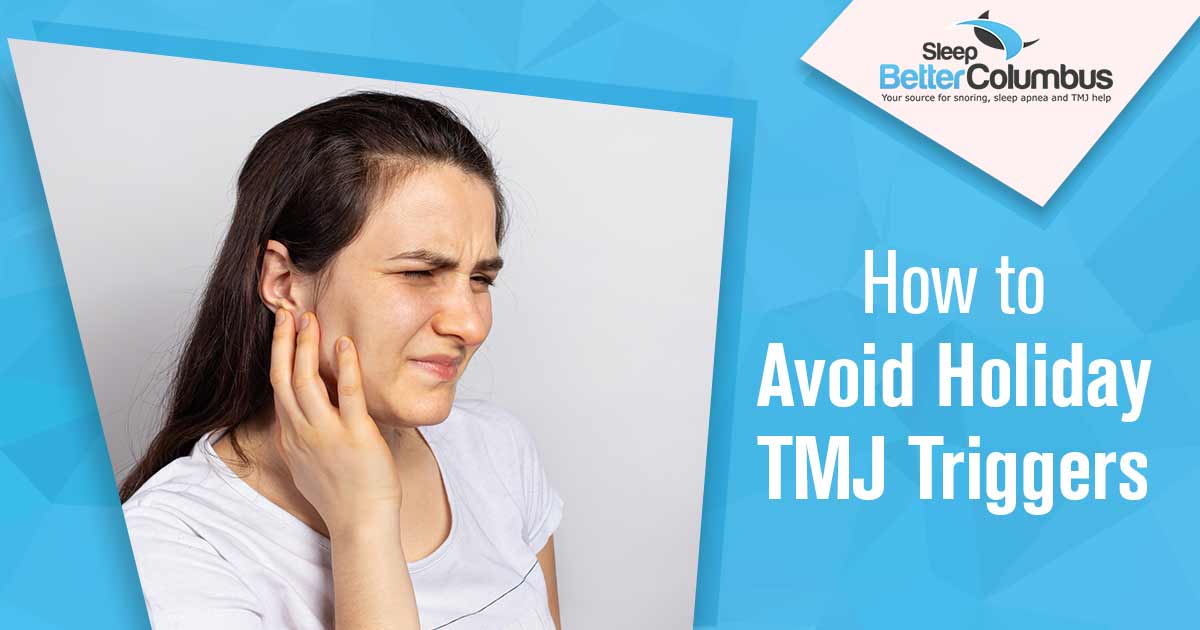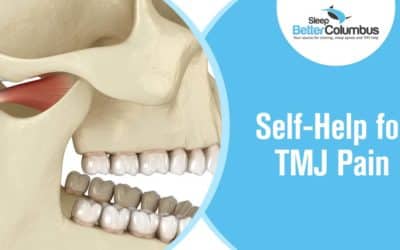Is TMJ Seasonal?
The temporomandibular joint is affected by temperature changes just like any other joint, making it seem like TMJ disorders are seasonal. In seasons with warmer temperatures, joints tend to loosen, which decreases discomfort and other joint issues. When the temperatures grow colder, the decrease in temperature adds extra stress to your jaw muscles and can cause an increase in your TMJ pain and symptoms.
TMJ Symptoms Often Increase During the Holiday Season
TMJ pain and other symptoms often worsen or increase during the holiday season because many common TMJ disorder triggers occur more frequently during the holiday season.
Symptoms of Temporomandibular Joint Disorder
Symptoms of TMJ disorders can vary greatly. People with TMJ might experience jaw, face, shoulder, or neck pain. The pain from TMD can be mild or severe, and some people will experience chronic pain.
Some common symptoms of temporomandibular joint dysfunction include:
- Pain or tenderness in the jaw joint and/or chewing muscles (the most common symptom)
- Difficulty chewing or pain while chewing
- Aching pain in and around your ear
- Stiffness in your jaw
- Swelling of the side of the face
- Toothaches
- Pain that spreads to the face and/or neck
- Tinnitus (ringing in the ears), hearing loss, or dizziness
- Headaches and/or migraines
- Blurred vision
- Limited movement or locking of the temporomandibular joint, making it difficult to open or close your mouth
- Painful clicking, grating, or popping in your jaw joint when you open or close your mouth
- Changes in how your upper and lower teeth align or fit together
Common TMJ Triggers
- Stress: Stress can cause you to clench your teeth in the daytime or grind your teeth at night.
- Dehydration: Being dehydrated affects the amount of fluid in your body and the hydration your joints require to function correctly.
- Poor posture: Poor posture and leaning forward too much can impact the alignment of your joints.
- Eating: Foods that require excessive chewing can increase pain and tenderness in your jaw joint and chewing muscles.
- Hormonal changes: Fluctuations in hormone levels affect joint inflammation; this TMJ trigger especially causes problems for women.
Navigating the Holidays and Holiday Travel with TMJ Pain
The holiday season and traveling during the holidays can be hectic and stressful. The additional stress and anxiety experienced during the holiday season can lead to a temporomandibular joint disorder flare-up, partially because you might increase tension in your jaw and facial muscles.
Tips to Help Reduce Stress and Avoid TMJ Pain While Traveling During the Holidays
- Budget extra time for yourself when traveling. If you give yourself extra time for traveling to the airport or getting to your next stop when driving, you can decrease any stress that might happen when something unexpected occurs that might delay you.
- Keep all your TMJ disorder gear close by no matter how you travel. If you are flying, keeping anything you use for TMJ flare-ups and your usual TMJ treatment in your carry-on is best. This can include a neck pillow, pain medication, a nightguard, or other oral appliance. If symptoms arise, having your TMD gear nearby means you can quickly alleviate your pain and resolve any other symptoms.
Tips to Help Prevent TMJ Pain During the Holiday Season
- Ensure you have plenty of the items you use for TMJ flare-ups. It’s not always easy to get to a store during the holidays, and having anything you need on hand means you can quickly deal with any symptoms. These items might include painkillers, essential oils, heating pads, and comfy pillows.
- Make sure you are getting enough sleep. When your body doesn’t get enough rest and sleep, it needs to function correctly, and temporomandibular joint disorder symptoms can arise or worsen.
- No matter how you will spend your holiday season, whether taking a road trip, flying, hosting a holiday, or having a quieter, more minor holiday at home with just a few people, making a plan can help you prevent any potential issues that could increase stress and anxiety and create or exacerbate TMJ symptoms.
-
- Make a holiday menu and shopping list.
- Plan out your shopping trips for holiday gifts, meals, or decorations. a
- If you’ll be traveling, take the time to pack ahead of time.
- Planning food options or packing snacks in advance can help you avoid foods that can cause a TMJ flare-up.
- Do your best to follow a TMJ-friendly diet during the holidays and avoid hard, crunchy, and chewy foods that can worsen TMJ symptoms.
TMJ-Friendly Holiday Foods
- warm, creamy soups (especially when the weather is colder)
- fruit pies like apple pie, berry pies, and pumpkin pies
- puddings and custards
- mashed potatoes
- fish
- chicken (darker meat is more tender)
- rice
- quinoa
- turkey (darker meat is more tender)
- soft rolls, breads, and biscuits
- pasta
- sautéed, steamed, boiled, roasted, or baked vegetables
- macaroni and cheese
- soft fruits without skin or seeds
- deviled eggs
- smoked salmon
- soft cheeses
- ice cream
Sleep Better Columbus Can Help with TMJ Pain
The skilled TMJ specialists at Sleep Better Columbus can help you with TMJ pain and discomfort. We work with you to find the best treatment plan with options like home remedies, self-managed care, and nonsurgical treatments like dental oral appliances.
To learn more about how we can help with TMJ pain and treatment, call us at (614) 777-7350 or fill out our online TMJ Consult Form.




